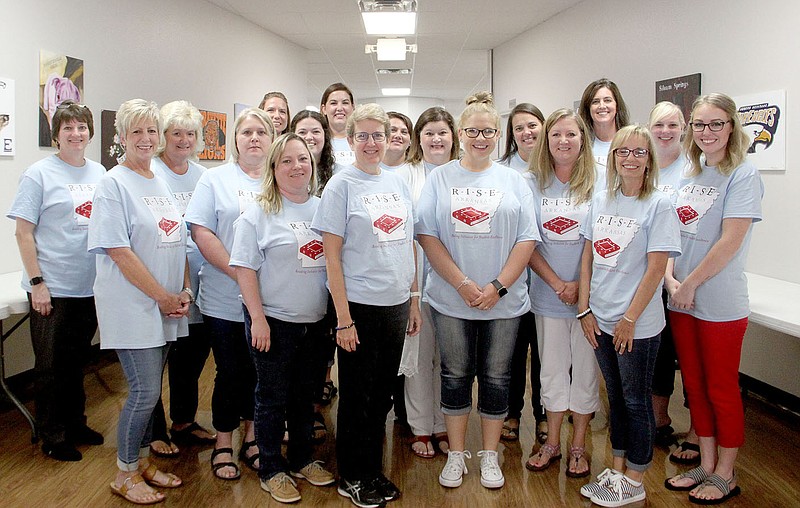FARMINGTON -- Lincoln Elementary is one of four schools in Northwest Arkansas selected as a pilot school for a new initiative to boost reading levels for students in third-eighth grades.
For the first year, R.I.S.E. Arkansas, or Reading Initiative for Student Excellence, will focus on kindergarten-second grade students at schools with higher poverty levels.
Lincoln teachers recently attended a week-long RISE Academy at Northwest Arkansas Education Service Cooperative, along with teachers from the other pilot schools, Huntsville, St. Paul and Asbell in Fayetteville.
Penny Ezell, a literacy specialist with the cooperative, said schools with higher poverty levels were chosen because many of their students have not had a lot of literacy experiences.
"We want to change the trajectory of those kids and break the cycle of poverty," Ezell said.
The overall goal of RISE Arkansas is to encourage a culture of reading statewide through community partners, parents and teachers. The program was developed by the Arkansas Department of Education to establish the importance of reading in homes, schools and communities.
Schools have been involved in different reading initiatives and pieces from these are incorporated into the RISE Arkansas program, said Sandy Shepard, a literacy specialist with the Dawson Education Cooperative in Arkadelphia. However, the main shift is realizing learning to read is not visual but auditory.
Teachers are looking at the science of reading and seeing how a student actually learns to read.
Phonics is a big part of the new initiative but instead of focusing on the 26 letters of the alphabet, students will learn to read based on the 44 sounds in the English language, Shepard said.
"The whole piece is that we learn auditory," Shepard said.
Ezell said reading is not a natural process in development.
"Our brains were born to communicate, to have discussions," Ezell said.
She said teaching students to read can be compared to rocket science.
"So much goes on in the brain when you are reading," she added.
RISE uses multi-sensory instructions and builds the path to reading through phonics and lots of practice. Teachers are learning strategies to use based on evidence and research and how to make data-based decisions to help their students.
Kim Brown, also a literacy specialist with Northwest Arkansas cooperative, talked to teachers about the value of practicing reading throughout the day. For the average student, it takes four to 12 repetitions to learn words. For the least capable students, 20 or more repetitions are needed, she told teachers.
Typically, teachers may teach a reading lesson for 20-30 minutes and then go on to other lessons the rest of the day.
The idea, Brown said, is that a reading lesson must continue throughout the day.
"We want kids to read the words, not memorize the words," Brown said. "As you use the lesson throughout the day, your students are practicing the piece you are teaching. You teach it and practice it. You teach it and practice it."
Connie Debes is in her 33rd year teaching at Lincoln Elementary School and she said RISE will be a shift in the way they've taught reading in the past.
"We are learning steps to put multi-sensory focus into our teaching," Debes said, noting this means students will learn to read through movement, touch, visual and auditory.
"It's going to be fun. We will reuse stuff we already have, adding to it and detracting from it."
According to a fact sheet about RISE, the new reading initiative was developed for several reasons.
Currently, only 31 percent of Arkansas' fourth-grade students are proficient in reading and 27 percent of the state's eighth-grade students are proficient in reading. Arkansas ranks in the lower third in reading scores, compared to other states.
Goals for RISE Arkansas are to increase the number of students in grades 3-8 who meet the ACT Aspire reading readiness benchmark by 10 percent within three years. Currently, that percentage is at 48.6 percent.
Another goal is for the state to rise above the bottom third in reading scores within five years and to increase the number of graduates who meet the ACT reading readiness benchmark by 10 percent within five years. Now, 39 percent of Arkansas' graduating seniors meet the reading readiness benchmark on the ACT test.
Lincoln teachers will attend other training sessions throughout the year and the cooperative's literacy specialists will observe in the classrooms to provide additional assistance to teachers.
The RISE Academy will expand to include teachers in third-12th grades in 2018-19.
General News on 08/16/2017
